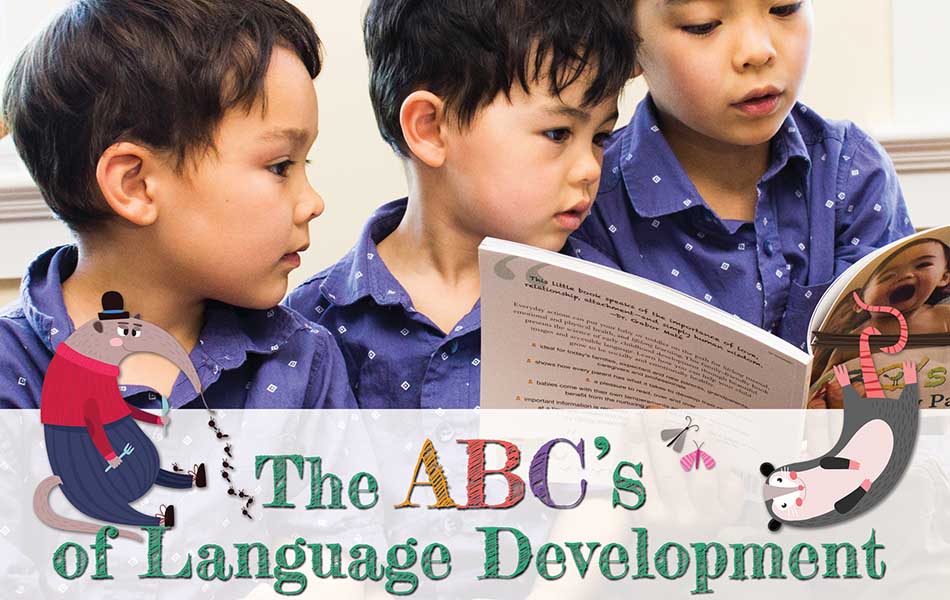A new book co-authored by a UBC professor outlines the latest research and practical strategies to support the language development of all children – and the ebook will be available free.
The ABCs of Language Development: Discover Language With Your Child is organized in an A-B-C format, allowing busy caregivers to choose a letter to read, check out the tips on pages with yellow borders or explore the science on pages with blue borders. Language Sciences members Dr. Carla Hudson Kam, a Linguistics professor, and Caitlin Bittman, a speech-language pathologist (SLP), discuss why anyone supporting children should take a look.
How did you come to write this book?
CHK: The project with KidCareCanada was suggested to me at a time when I was starting to think about how to make connections with policy makers and organizations that work more directly with families and children, applying my knowledge and skills to helping real people in the real world. It turned out to be so much more than what I had been looking to do, in a really wonderful way, and the writing team is an amazing group of women, who are all passionate about children and their development.
We tried to write it in a way that kept it accessible, without dumbing down the science. We also wanted to try and make sure that the ideas in the book don’t feel like obligations, or ‘musts’.
Caregivers have enough pressure to do things perfectly, and we didn’t want this book to add to that.
- Dr. Carla Hudson Kam
CB: I met KidCareCanada co-founder Estelle Paget back in 2018 when I was a guest on KidCareCanada’s talk show series. It became clear that we shared similar passions and perspectives about early childhood development, language, and the importance of empowering parents to raise healthy, thriving children.
Estelle shared with me her dream of writing a second ABCs book focused on the topic of language development. As a pediatric SLP, most of my time is spent providing treatment to children and families after there is an identified delay or other communication need. I viewed this book as an opportunity to work in the area of prevention, supporting parents and children before there is an identified need.
Who should use it?
This book is written for all parents and caregivers, and for children of all abilities and stages of development, as well as for professionals who work with or spend time with children.
- Caitlin Bittman
It contains information to enable anybody to support the communication development of any child. It also contains valuable information about when and how to seek help if there are questions about how a child’s communication is developing.
Caregivers of children with a suspected or identified communication delay may also wish to read our companion document, My Child needs Extra Communication Support, which can be found
. This document provides more detailed information about the many areas of communication development, as well possible indicators of a delay and practical strategies parents can use to support their children. While this document does not replace an assessment by an SLP, it is a great tool.
Why is language development important in childhood? Does the language matter?
CHK: Language is a big part of what makes us human. It enables communication, and it allows us to learn from others. It’s how we pass on our culture and traditions.
Language skills impact so many aspects of life: social skills, reading and math abilities, and even an individual’s ability to think about other people’s thoughts. And when a child doesn’t get early rich exposure to a language it can have lifelong impacts.
- Dr. Carla Hudson Kam
So it’s really important for all children to get rich experiences with a language that is accessible to them. It’s also the case that the kind of interactions that are best for learning language help a child gain knowledge of the world around them, and most importantly, are very good for a child’s social and emotional development. So helping all kids get the best chance at learning language really isn’t just about language – it’s about supporting their overall development.
Stay tuned for the ABCs ebook, which will be available free!
Note: We're happy to work with families and organizations on a one-to-one basis to accommodate pricing - please feel free to email us to enquire at language.sciences@ubc.ca. In addition, if your agency receives funding from a municipal, regional, provincial and/or federal source, you may qualify to become a customer of Crown Publishing and be eligible for municipalities, universities (colleges), schools and hospitals pricing. Please click here for more information.
